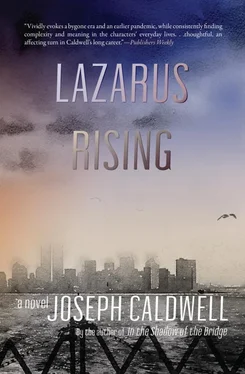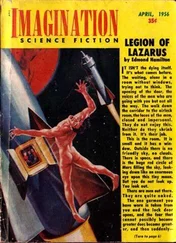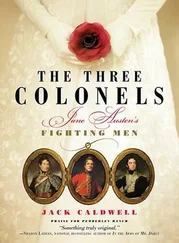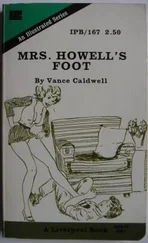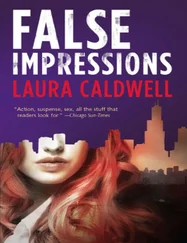For Doctor Norstar she provided a welcome relief from those patients who often balked at an increase in their medication. Instead of groans or frightened concern about added intrusions into her system, Dempsey now greeted a changed or enhanced menu with eagerness and gratitude. When Doctor Norstar would patiently present her reasonings, taking time to explain the difference between pharmacokinetic interactions and pharmacodynamic interactions, Dempsey would nod her understanding. But her eagerness, her hope, was founded on a wish that this latest attempt to delay her doom would come in red or at least green, a contribution that would enliven a collection that threatened to be overwhelmed by the beige, the buff, and most boring of all, just plain medicinal white. (She knew that white was the presence of all colors, but she preferred to have the inclusions broken down into more exciting components.)
Dempsey had started her collection the day she’d thrown up on a sculpture by her friend Harden Lavrans in a gallery on Greene Street. She didn’t particularly care for the sculpture, a pyramid of black spheres that resembled—no, replicated exactly—some cannonballs she’d seen any number of times placed in pyramids next to Civil War cannons in any number of town memorials. Knowing Harden, however, and his work, she knew that this was more than a pile of cannonballs. They could be basketballs, and being black, they suggested both black sexuality and masculinity as well as commentary on the success of black male ascendancy: sports. Then, too, the structure was an added commentary on the subject. It was a pyramid. Slaves had built the pyramids. By extension, blacks had made possible one of the wonders of the world. The contrast between pyramid building and playing basketball was intended as a topic for meditation, with special consideration given to the fact that only one would rise to the top. The others no more than support, needfully suppressed. But then, at the same time, these were replicated cannonballs. This might suggest, for those perceptive enough to see, that blacks were considered cannon fodder. Or bombs, ready to explode.
Dempsey had sighed. Harden was a tow-headed Scandinavian from Iowa—and about twenty years behind the times. In the Sixties, full appreciation would have been given to his true but obvious statement. Critics would have fallen all over themselves in congratulation for having seen what Dempsey was seeing now. They would have beamed at having solved the puzzle, for decoding the intellectual messages hidden within, for ferreting out the political agenda, for being challenged, in their reviews, to demonstrate their acuity, their unfailing and necessary ability to make a great deal out of very little. Dempsey herself had, within seconds, experienced all this and was probably well on her way to extracting more from the quite scrutable sculpture, but she’d thrown up instead.
She had not intended so harsh a criticism. What disturbed her most was the content and color of her vomit. Instead of the rejected remains of a decent meal, there, for all to see, unchanged in form or substance, were the pills she’d taken hastily, just before entering: Zovirax, Myambutol, Rimactane, Pyridoxine. Some of the pills slipped down into the crevices between the balls, others seemed stuck where they’d landed and the rest slowly slid along the slope of the balls so they dripped onto the floor.
With two quick breaths, Dempsey recovered from the spasm of throwing up and, as if she had simply deposited a cleansing agent onto the sculpture, knelt down and proceeded to wipe and rub her scarf along the balls, gathering up her pills and soaking up her mucous into the woolen cloth. The young man attending the gallery was at his desk in an alcove and the one other visitor was at the window looking out over Greene Street or, perhaps, at another exhibit across the way. Just as she was picking up a Zovirax—a beautiful robin’s-egg-blue capsule—the attendant came out from the alcove. Passing by as he went toward the man at the window, he said somewhat cheerfully, “It’s probably a good idea not to touch the artwork.”
Dempsey let the Zovirax lie where it lay, hoping some unsuspecting mouse wouldn’t mistake it for an interesting morsel and give itself the hallucinations mentioned among the several possible side effects.
By the time she had rolled up the contaminated scarf, she had vowed never to take another pill, another capsule, another dose of anything prescribed. If that’s what they all looked like inside of her, no wonder she felt lousy. And besides, what if she had come to the opening of the show and this had happened then—in a room crowded with people more than several of whom could, after one quick glance at the undigested meds, give a complete and accurate diagnosis of her illness, her condition, and possibly her prognosis. This was knowledge she was not yet prepared to divulge to the public at large. The pain and pleasure the knowledge of her illness might cause would have to wait until the day when she could no longer conceal her condition or, more likely, until she had decided that she herself was ready to inflict the pain and pleasure the revelation would create. It would not be a public spectacle as it might have been just now. She may have little or no control over the epidemic; all the more reason to keep control over the announcement of its presence.
From now on—she was jamming the scarf ends into her tote bag, punishing them for popping out twice now—if her body wanted to disintegrate and die, that would be its business. It was free either to oppose or to cooperate with the virus to which she had introduced it when she was still on drugs. No more prodding and prompting from her and from Doctor Norstar.
The idea had an extravagance that appealed to her, a stubbornness of which she heartily approved, a sense of vengeance that gratified her need for spite, for contempt. Of course, a time of testing would come. Would she be willing to accept the fevers and sweats, the diarrhea, the hiccups, the chest pains and headaches that would assault her at will when a simple popped pill held the promise of relief? Could she ignore the weight loss, the distended belly, the swollen legs and ankles? Would she be able to sustain herself through periods of feeling just plain awful—as if no particular part of her anatomy was being attacked but, instead, the illness had invaded her entire being, targeting not just her body but her spirit, a dull meanness, an abusive discontent, an exhausted disgust with all the separate components that defined her being, each contending with the other as to which would be attacked next?
Doctor Norstar, of course, would be a problem. When told she’d need no more medicine, the doctor wouldn’t argue; she’d just become exasperated. This, more than any prospect of pain, prompted Dempsey to reconsider. Doctor Norstar’s regard had been, perhaps, more sustaining than the medicines she had dispensed. For Dempsey to reject her ministrations, to invite her disdain, would be impossible. There was nothing Dempsey wouldn’t do for Doctor Norstar. When the doctor had told her to eat Jell-O, she’d eaten Jell-O. When it was no more than suggested that Dempsey might walk a mile a day, Dempsey walked twice that, down to Battery Park and back. When it rained, she’d walk back and forth in the loft like a swimmer doing laps. When Doctor Norstar told her to make sure the loft was properly ventilated, Dempsey finally—after three years of procrastination—installed not one but two vents. If Doctor Norstar were to tell her to swim the Hellespont, she would at least give it a try. And if Doctor Norstar gave her a prescription, she would, without question, accept it and follow the instructions faithfully.
Deceit suggested itself. Dempsey, ever eager to have her own way without jeopardizing approval, almost immediately decided she’d simply lie (by omission) to Doctor Norstar. She’d take the prescriptions, have them filled, then collect the contents in the large brandy snifter she’d once used for a terrarium. Dempsey would see, hour by hour, day by day, the toxic, nauseating medicines rise: she would observe what she had spared her already weakened system. Pleased that she had devised a plan that involved stubbornness, deceit, and the kind of self-dramatization she particularly enjoyed, Dempsey gave the top of Harden’s sculpture one more brush with her hand to collect and absorb any particles of the virus that might still be clinging for dear life to the surface she’d so recently polished with her heavings.
Читать дальше
